
By: Karla Fetrow
Preamble to Privilege
If you are an atheist and you see something so beautiful, you want to give thanks for it, who should you credit? This was what I asked my traveling companion as we entered the Wrangell/ St. Elias reserve. After weeks of rain and washed out roads, the sun had finally decided to behave for a day, and lift the perpetual cloud coverage that historically enjoyed clustering around the turbulent ridges of the Wrangell mountains. All human ingenuity simply does not rise to the occasion when faced with the spectacular masterpiece of nature’s inspirations. “You must be my lucky charm,” he answered. “This is my third trip and the first time I’ve been here when it wasn’t raining.”
The mountains and I sometimes seem to hold a communion. If I go out of my way to visit one, it usually graces me with its presence, although I don’t seem to be very successful at holding back Cook Inlet rain. For whatever reason, a sublime graciousness, or simply very good timing in a territory well known for flash floods and shifting water tables, we were allowed a full day of clear sky to explore our new surroundings.
Our mission was to view the extinct volcano located thirty-five miles along the Nesbesna Road, which connects with the Richardson Highway about ninety miles from Tok. Extinct, as in dead, as in never again to tremble in fire and molten lava. Scientists say there are no truly extinct volcanoes, just dormant ones. Skookum’s dormancy is the twisted skeleton of primordial upheavals, the blackened bones of ancient rages fallen away with tears of stone. Its cliffs appear like dark soldiers guarding the gates of a time more distant than all our collected and analyzed memories. Under the shadow of Skookum, there is only the small, the impotent. There is only the reminder that no matter how great we believe ourselves to be, there is something far more powerful rumbling beneath the mantle of an evolving Earth. Here is the violent underworld, the declarative statement of what is and its monument to what has been.
Off the Beaten Path
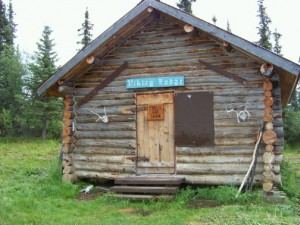
Not everyone who is planning a road trip would consider a drive up the Nesbesna Road a privilege. The guide books describe the camp grounds as “primitive”. That is to say, there are no RV hook-ups and no modern plumbing. In fact, the last electric line you’ll see for the rest of your trip will be just as you turn at the junction. The campgrounds, however, are well maintained. They each have a picnic table, a fire pit and a clean outhouse. There are also a number of public use cabins that can be reserved with nothing more than a phone call to the parks and recreational department, and are absolutely free. All you have to do is hike into them. Camping trails are carefully marked, but the best way to find your designation is to keep one eye on the mile posts and the other on your guide map.
It’s remarkable how much we take for granted the placement of electric lines into our field of vision. In fact, my eyes played tricks on me for the first twenty miles, refusing to believe there were absolutely no black, straight lines separating my field of vision from the landscape. It does something to you, witnessing this undisturbed line of sight. You become suddenly aware of what it must have been like before we placed ourselves in little square boxes to look through. The world becomes larger, more integrated and personal. It breathes.
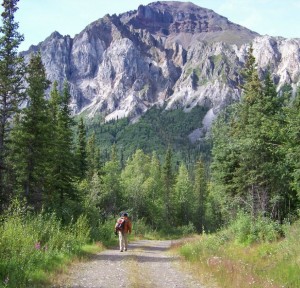
Once my eyes had become convinced they were not hallucinating, my ears became troubled. Once we’d started up the trail to our cabin, I realized there was absolutely no noise beyond the gusts of wind stirring the branches, the occasional screech of a raven or magpie, and our canteens rattling against our belts. There was no distant hum of vehicles traveling down the highway, no planes murmuring through the sky, no mechanical sounds at all. My usually over-stimulated nerves relaxed and I even enjoyed the steaming pants of the dogs when they returned after chasing down a squirrel.
Our next two days would be staged from an old homesteader’s cabin with candles to light us and reading material for company. I slept their lives, I think, dreaming of a woman’s loneliness in her isolation. She fretted over some quilting pieces she’d cut and that had gotten wet from the torrential rain. One by one, she took them out and hung them over the pot-bellied stove to dry, or draped them along the window sill. I woke up, thinking of those quilt pieces; how each one symbolized a piece of her life; a new dress, a blouse she’d put together from a pattern, the useful bits hoarded, saved and cut with exacting precision.
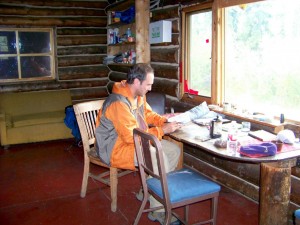
It had been raining when we arrived and was raining when we first awoke, but as we settled down to our first cup of coffee and began planning our day, the sky cleared. All at once, the tentative agreement to try out one of the lakes for a little fishing turned into a definite plan to drive along the Nesbesna to the end of the road. It was volcano viewing time or bust.
Nesbesna begins as a buckling, casually paved road, filled with pot holes just waiting to surprise you, and gets worse. The pavement crumbles into gravel. The gravel buries into mud or washes away with the frequent flash floods. Culverts to keep the road from washing out, fail, and in places, the creeks take over. How do you cross a creek when there is no bridge? You look for the shallowest spot and keep driving. Don’t even think of stopping for a moment to change your tactics.
Other than a couple of wash-outs, the road stayed in fairly good condition as far as the volcano. Instead of taking the trail to its rim, however, we had another goal in mind. We wanted to see the Nesbesna gold mine. We stopped at a small store a few miles before the end of what the State of Alaska assures us is a maintained road and asked if the flood had done any more damage. “Oh yes,” she answered. “There’s a far more difficult place to cross just ahead.”
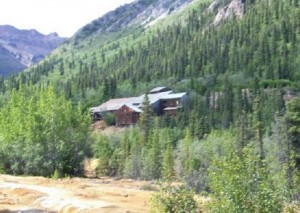
She was right. Other than a few wavering tire tracks, it was difficult to call our path a road at all. We were as often bumping cautiously through streams as wide as rivers and every bit as volatile, as we were driving on high ground. We ground over the top of lava rock strewn land slides. Finally, we turned a bend that not only carried us into a higher elevation, but a less turbulent landscape. The shelves of the road spread out to peaceful bursts of wild flowers nodding on grassy turf and gently rolling hills falling away into deep lakes and beyond, the distant mountain range. We had come as far as we could by road to the Nesbesna gold mine.
Greater than Gold
Carl Whitman staked the claim that became the Nesbena gold mine in 1926. The mine operated until 1945. By that time, 73,000 tons of gold ore valued at $1,870,000 had been shipped to the Tacoma, Washington smelter. Only limited, small scale extraction has occurred since that time.
Nesbena Mine is privately owned, but the Ellis family who reside on the property, allow hikers who are polite and leave no trash to clean. The trail is easy, four miles of slow grade and magnificent views. For the more adventurous, there is the one mile hike straight up the mountain to Rambler mine. The guide book says the trail is steep. From our experiences, we learned the guide book has a tendency to understate. If it says a trail is boggy, it means you’ll be wading knee deep through mud and marsh. If it says it’s steep, you’d better have a bit of climbing gear. We had no gear. We took the longer, but easier trail.
It was there, on that high road, with the snarling ancient volcanoes in front of us and the spilling Wrangell mountains cascading across a deep gully filled with lakes and tundra, that I heard Earth’s music. It breathed in and out like a soft lullaby. Above the low winds that whistled through the mountainous tunnels, it sang, each rustling breeze another note on a celestial pipe organ. First man, in his lowly attempts to imitate this natural melody, blew through a reed and discovered the delicious pleasure of creating music. What a marvelous gift, and yet that first man was not the one who truly bestowed it. Sweet earth, in all her complexities of emotion created that first melodious sound.
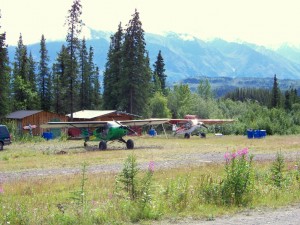
Most of the Wrangell/ St. Elias National Park is inaccessible by vehicle, although there are plenty of charter plane services. They will fly you out to any one of a number of magnificent spots where the fishing is everything you dreamed about, the wildlife is abundant and the rock climbing only for the hardy, but be sure to bring a tent and enough food for your stay. There are no facilities. If flying doesn’t feel affordable but you still want to get away from it all, it’s time to put on your hiking boots. During the summer months in Alaska, you don’t have to worry about it getting too dark to see, so a leisurely stroll can occur any time of the day with plenty of time for additional activities. In fact, it’s a great time to throw away your clock for there won’t be any appointments to keep, your cell phone isn’t going to pick up a signal and you won’t get to watch the six o’clock news.
On our way in to the mine, we met absolutely no one, although we had taken the easiest route. The old structure perched precariously into the hillside didn’t impress us. It looked much like any other mine, with the river of raw, oxidized mine trailings still scorching the ground, but the mine shafts, located over a thousand feet up a sheer rock face, did. We wondered how those brave little men had worked there. There were no signs of cable hitches although some sort of trolley device had to have been used. My friend shook his head with wonder. “They would have to pay me a helluva lot of money to go up there.”
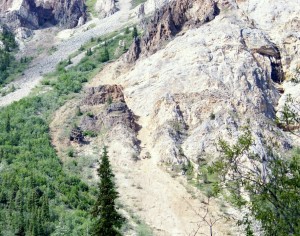
Maybe it wasn’t so much the pay, but the experience that kept them doing the impossible in a place that time had forgotten. Maybe in their turn of the twentieth century world, they were as weary of the modern invention, as worn out with war, as disillusioned with social pressure as we are today. Maybe it wasn’t the gold at all, but the escape and a dream of boundless freedom. The forty four miles of broken, washed out highway we crossed in a four wheel drive vehicle, they walked, with a wagon and mule team.
On our way back to the campsite, we saw exactly what was meant by shifting water tables. Many of the gushing creeks we had to cross going in had already dried to a trickle. At the broader ones, hikers were removing their shoes and socks and motor homes were unloading their four wheelers to cross. Clouds had already started moving back in, so we felt we had gotten the best of the camping experience. Once the rains returned, so would the rampant rivers. Once the rains began, the four wheelers and hikers would have to wait until the waters ebbed to cross back over.
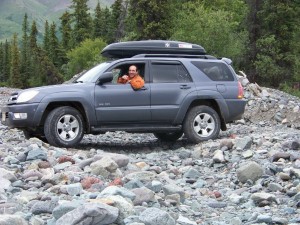
It was good timing, but I was still reluctant to leave. It was the telephone and electric lines, the way they cut into the vision, reminding me we live in a grid work of square boxes and have for so long, we don’t even see the way the lines move across our vision, giving us a sense of measured and squared orderliness in a rioting, turbulent world of hills, curves, dips and virulent colors. We spend so much time communicating, we never take the time to commute with nature.
I felt there must be someone I should thank for this incredible beauty. Perhaps the Department of Transportation for not attempting to make this road least traveled more accessible, although they didn’t create the rapidly fluctuating water table. Perhaps the Department of Parks and Recreation for the well marked trails and comfortable cabins, although they didn’t fill the lakes with fish or produce the abundant wildlife. Perhaps the kindness of the local people who allowed the occasional visitor to cross their lands, although they weren’t the ones who raised Skookum out of the ground, terrible in its ancient eruptions and still biting with monstrous teeth into the sky. There must be something greater, wiser, than tiny man with his drawing books and rulers, declaring his dominion through electricity and communications. Something you only hear in the stillness uninterrupted by artificial sound. Something you see when the clouds clear and there is only unbroken sky. I can’t say I understand the mysteries of Earth; I’m not even sure if I want to. I don’t know how it is that I was privileged to see nature in all its rapture. I just want someone to thank.

“If you are an atheist and you see something so beautiful, you want to give thanks for it, who should you credit?”
Not who, but what.
“Nature” works in my case….
Great article, Karla! It sounded like a wonderful road trip. An unorthodox travel log, just the type we love. 🙂 I know what you mean about wanting to thank someone just for the sheer beauty of what you see. Great job.
Will, nature is good enough for me, but i generally say “she” instead of it, primarily because it’s very difficult to separate nurture from nature, and nurturing is typically associated with women. The farther we get from nature, the more we lose sight of our natural selves and our true potential.
Thank you, Mitch. Stepping off the beaten track is nothing unusual for me. I’ve been many marvelous places and seen some wonderful things, but i don’t think i’ve ever heard the music of the earth before. It was outside of me and all around me. I don’t think anything i write could ever do justice the beauty that was in those reed like sounds. Put it in scientific terms and say it was the wind tunneling between the mountain ranges – it doesn’t excuse the fact that nature blew upon her magic flute and made music.
Thank you Karla and Thank She and He and It and Whomsoever for these precious precarious places that we still have left to us.
Seriously you should retake 4th grade… your grammar is atrocious! My eyes hurt, thanks.
Man I like this comment and it is so informational and I am gonna save it. I Have to say the Indepth analysis this article has is greatly remarkable.Who goes that extra mile these days? Bravo. Just one more tip you shouldget a Translator for your Global Audience !!!